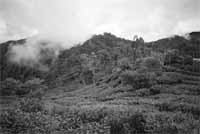More than a cuppa
More than a cuppa

makaibari tea estate, three kilometres off Kurseong town in Darjeeling, is probably one of the few tea gardens in the district that can boast of having a greater percentage of land under forest than tea. It is one man's vision that has catapulted the decades-old plantation into a biodiversity-rich environmental treasure.
While most tea gardens in Darjeeling are run by managers, Makaibari is essentially a family business with the owner living on the premises. "You have to reach out to the people who work for you, speak their language and live their life,' says Rajah Banerjee, the owner of the 673-hectare (ha) tea estate, of which only 274 ha is under tea cultivation.
In a path-breaking move, Banerjee decided to turn to organic farming. This decision was ridiculed by all surrounding tea garden owners as, in organic farming, the yield falls drastically during the first few years. The method of farming practised at Makaibari is based on the "biodynamic' system of agriculture. Developed by Rudolf Steiner in 1924, this method is based on the concept that each plant has its own contribution to make to the health of the soil. Hence, unlike conventional agriculture which believes that weeds are competing with the tea plant and therefore must be destroyed, at Makaibari a wide variety of native plants and herbs are encouraged to grow alongside. In 1994, a German scientist identified as many as 140 different kinds of plant species at Makaibari, each playing their own role in enriching the soil. Thus, while other tea estates practice monoculture, Makaibari stresses on permaculture, a heterogeneous array of vegetation interspersed with tea bushes.
Producing some of the finest tea in the world is not enough for Banerjee. He is aware that measures have to be taken to involve the local people in the protection of the forests. For instance, Makaibari has its own "forest department'. From among the local people, 18 have been selected to patrol the forest day and night. There are two strategies that Banerjee generally follows to boost the morale of the forest rangers. He sometimes accompanies them on the rounds, even in the night. Another is to give cash incentives to anyone who is able to catch a poacher or a timber thief. The culprits are then handed over to the state forest department.
Regular afforestation drives are also organised at Makaibari to involve the people in conservation efforts. But these are not mere "tree planting ceremonies'. Each year, in consultation with the workers, a part of the forest is selected for afforestation. One out of five trees planted is a fruit-bearing tree to ensure that the local people benefit from the exercise. To meet the fuel needs of the 1,500-odd people living in and around the tea estate, they are allowed to collect the dry and dead wood from the forests.
There are other new projects that are constantly being introduced by Banerjee. For instance, because of the large livestock population kept by the workers, biogas units have been introduced in many villages to meet the fuel need. Emphasis is also laid on family planning programmes where workers are made aware of their responsibility in ensuring that the resources are not consumed by the growing population.
In yet another scheme, efforts have been made to encourage schoolchildren to collect plastic bags scattered in the forest area. The plastic is collected by the factory and sent to nearby Siliguri for recycling.
Another distinguishing feature of Makaibari is the women workers. Aggressive and articulate about their rights, many of the trade union leaders are women. They have made Makaibari the first tea estate to introduce female supervisors, a post which was reserved for men.
But cash incentives and schemes aside, the fact is that the forests of Makaibari have been preserved across four generations with negligible incidents of poaching or illicit felling simply because the local people have a genuine love and respect for the biodiversity that surrounds them.
Makaibari is a classic case of people's participation in the management of their forests. It proves that the people's requirements can be reconciled with conservation needs. And does not necessarily mean the alienation of the people from the forests.
Bahar Dutt is a social scientist at Development Alternatives.







